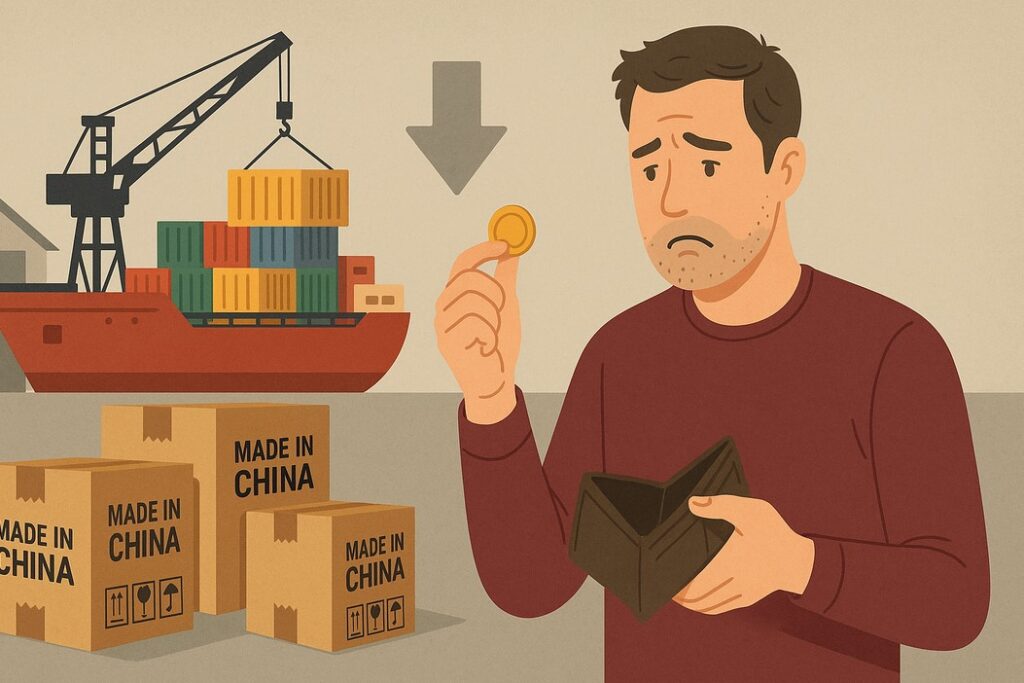- Do consumers benefit from cheaper imports?…
- It all comes down to Say’s Law…
- Robert Kiyosaki’s new warning reveals the shocking truth about the economy they don’t want you to know. Don’t be left behind. Click here to get his urgent action plan now!
Dear Reader,
Do consumers benefit from cheaper imports?
This is the question of a certain Michael Pettis. Mr. Pettis is a senior fellow of the Carnegie Endowment for International Peace.
I begin today’s inquiry with a caveat.
I have always clung — resolutely — to the theory that cheaper imports do in fact benefit the consumer.
That is because each dollar he saves on cheaper imports represents one dollar available for alternate duty.
He can dedicate that dollar to the purchase of other goods and services.
That dollar he can save. That dollar he can invest.
Thus economic activity fans out in ever-widening circles — due to cheap imports.
And has anyone ever objected to money-saving?
Cheap Imports and Say’s Law
Yet Mr. Pettis says to take the broader view. Cheaper imports, in his telling, are not necessarily virtuous.
As sugar may seduce the tastebuds yet imperil the body… cheap imports’ sweet benefits may mask unhealthful costs.
The rock of his argument is a sort of internationalized Say’s Law.
Say’s law holds that supply creates its own demand. “Products are paid for with products,” argued Jean-Batiste Say over two centuries ago.
That is, production must precede consumption.
Only after he produces can a man consume.
This Pettis fellow argues that the United States consumes before it produces.
Thus the United States pegs along in violation of Say’s Law.
The ultimate result is an economic stagnation that washes away the apparent benefit of cheap imports.
It’s All About Productivity
Mr. Pettis:
- For decades, Americans have been told that low-priced imports are an unalloyed blessing. By purchasing goods produced more cheaply abroad, Americans can stretch their paychecks and raise their living standards.
- But this story muddles cause and effect. The real benefit of international trade is that it helps countries to maximise domestic welfare by maximising the value of domestic production. For the global economy, as well as for each individual country, it is only by producing more that we can consume more.
- Cheap imports can actually have the opposite effect if they encourage lower domestic production. When the US runs a trade deficit, it is buying more from the rest of the world than it sells. The result is that rather than pay for American imports with goods and services produced in the US, Americans pay by transferring ownership of stocks, bonds, factories, real estate and other American assets.
Thus Americans consume not through production as they would under Say’s Law — but through the sale of assets.
Hence, the rise and expansion of the “service economy”:
- What’s more, the American economy, with its largely open trade and capital accounts, automatically accommodates the weak demand in countries whose industrial policies are designed to boost their shares of global manufacturing at the expense of domestic demand. It does this by shifting American production from manufacturing to services, regardless of actual American preferences.
Say’s Law, Say’s Law, Say’s Law
And so cheap imports only benefit the United States if they stimulate the machinery of domestic production:
- That’s why the simplistic claim that Americans “win” by getting cheap T-shirts from Bangladesh or cheap cars from China misses the point. Americans win from trade not when imports are cheaper, but rather when those imports cause a shift in American production that leads to faster productivity growth.
- In other words, if trade leads to a more rapid expansion in domestic production, workers will improve their welfare and consume more whether or not imports are cheaper. And if trade doesn’t lead to a more rapid expansion in domestic production, they will not improve their welfare even with cheaper imports.
Yet through American purchasing of their wares, foreign producers are handed United States dollars.
The greater the trade deficit, the more dollars they are handed.
They often reinvest these dollars in the United States economy.
That investment fortifies and invigorates the United States economy.
Why, then, should we be against trade deficits?
Can Cheap Imports Actually Limit U.S. Investment?
Here is why, says Mr. Pettis:
- By… making American manufacturers less globally competitive, foreign capital may actually put downward pressure on US investment. We can see this in the tendency of American businesses to hold record amounts of cash on their balance sheets, even after they have spent trillions of dollars in stock buybacks, dividend payments, acquisitions, and the transfer of production facilities abroad…
- When a country’s investment is constrained… by competition from low-cost imports, increasing the supply of foreign capital may not spur investment. In fact, it can actually damp investment as the resulting higher currency makes domestically-produced manufacturing even less competitive…
- If there is no commensurate increase in foreign demand for American goods… the US economy won’t respond by increasing domestic production to satisfy rising exports.
A conundrum! How has the United States government addressed it?
Not by facilitating greater production — in satisfaction of Say’s Law — but by facilitating greater debt:
- US policymakers try to sustain demand either by expanding the fiscal deficit or by adjusting monetary policy to encourage households to borrow and spend more. Since the 1970s, in other words, net capital inflows do not accommodate rising investment — they are more likely to set off an increase in household or fiscal debt.
- This is also why the advanced economies that consistently absorb large net foreign capital inflows… are distinguished among their peers not by lower interest rates, but by faster credit growth. Because capital inflows into these economies are not financing productive new investments that generate the returns needed to service the debt, they instead fund higher household or fiscal debt designed to prevent recessions caused by the leakage of demand abroad.
Time to Shift Priority From Wall Street to Main Street
What, then, is to be done?
- If we truly want to maximise American consumer wellbeing… the goal should not be to maximise cheap imports, as most economists mistakenly believe. It should be to maximise domestic production and productivity growth…
- When trade causes the economy to prioritise cheap consumer imports over production and investment… it mainly benefits Wall Street. And this is at the expense of American workers, farmers, businesses and, yes, American consumers.
In conclusion:
- We must rethink the conventional wisdom that the purpose of trade in the US is mainly to lower the price of imports. Ultimately, rising consumption can only be sustained by rising production. That is why for the US to improve long-term prosperity, it must recognise that the only way trade boosts domestic welfare and consumption is by boosting domestic production.
I remain unconvinced that cheap imports represent economic evils. And as with most theories, Mr. Pettis’ theories likely harbor bugaboos.
Yet his theories seduce me.
What is more, he has forced me to interrogate my prior assumptions. For that he has earned my gratitude.
As Mr. Thomas Huxley once counseled:
- Sit down before fact like a little child, and be prepared to give up every preconceived notion, follow humbly wherever and to whatever abyss Nature leads or you shall learn nothing.
I am prepared to give up every preconceived notion — except the notion that the world is governed by fools.
Brian Maher
for Freedom Financial News




